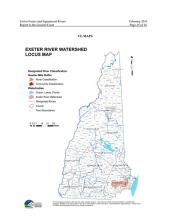
Population growth in New Hampshire ’s coastal communities is straining municipal stormwater and wastewater infrastructure and placing water quality and public health at risk. At the same time, communities are being called on to respond to new, more stringent permit requirements for discharging stormwater and wastewater from treatment plants. To address these needs, the Great Bay Reserve collaborated with an interdisciplinary team of scientists, coastal managers, environmental consultants, and three communities to create an innovative watershed-wide plan for stormwater and wastewater management to improve water quality and support the area ’s economic viability.
In 2012, the towns of Exeter, Stratham, and Newfields led by a team from Geosyntec Consultants, the University of New Hampshire, Rockingham Planning Commission, Consensus Building Institute and the Great Bay National Estuarine Research Reserve (NERR) received a grant from the Science Collaborative to develop the foundation for an integrated water resources plan.
Integrated planning facilitates the use of sustainable solutions, including green infrastructure, that protect human health, improve water quality, and manage stormwater as a resource. In addition, integrated planning helps identify other economic benefits and quality of life attributes that enhance the vitality of communities and maximizes the effectiveness of funds through analysis of alternatives and sequencing of actions.
The project concluded with a Final Technical Report in December 2015 as well as a number of resources for municipalities and partners.
- Draft Nitrogen control plan, schedule and financing estimate for Exeter, Stratham, and Newfields - Final project presentation, Feb 2015
- WISE samplig map - This map shows current and proposed water quality sampling locations connected to this project in the Exeter-Squamscott Watershed.
- WISE project website - This website archives a range of project documents, presentations, iterim reports